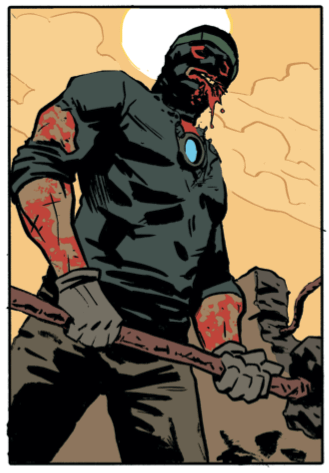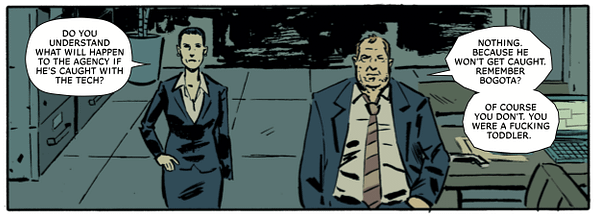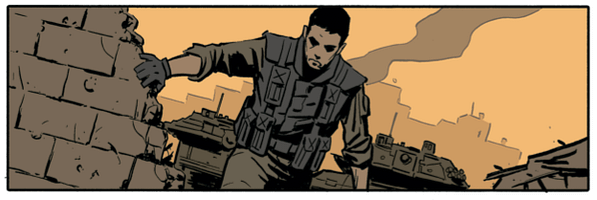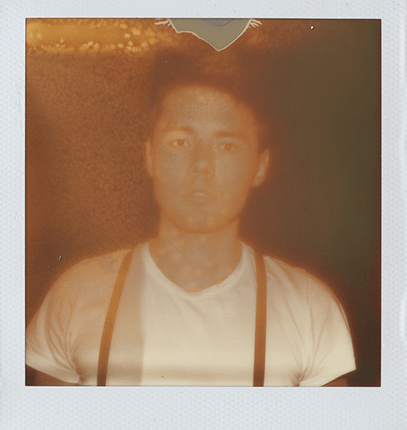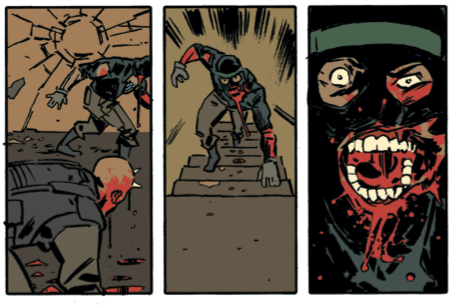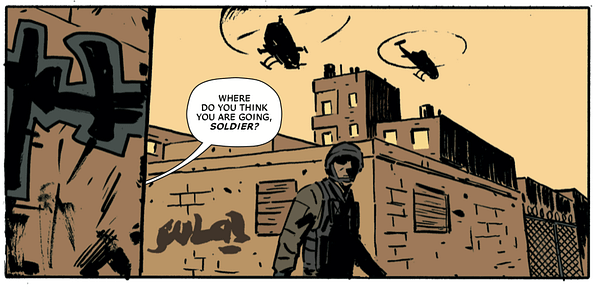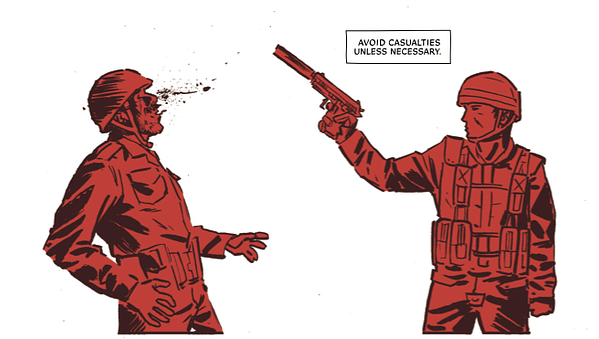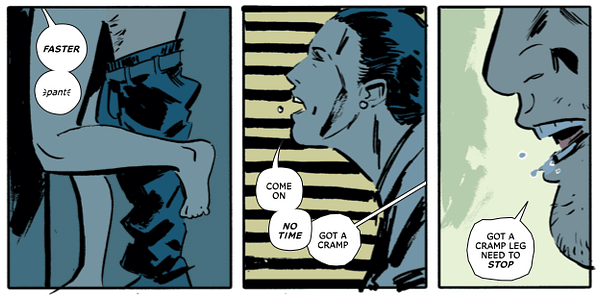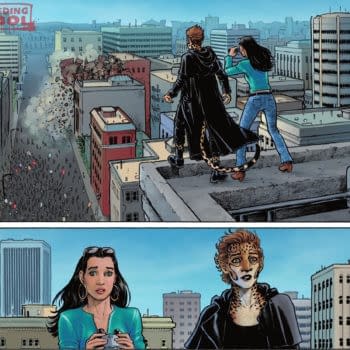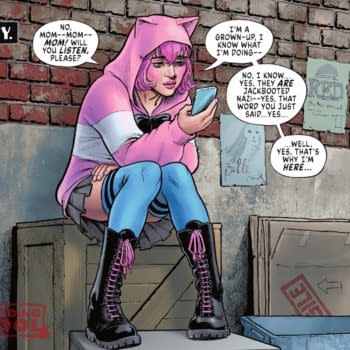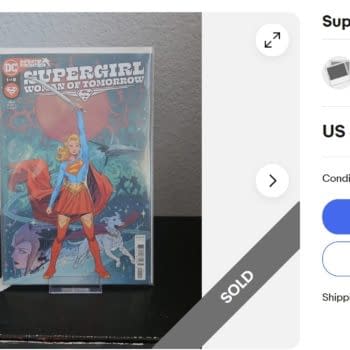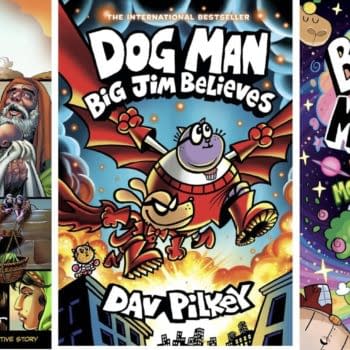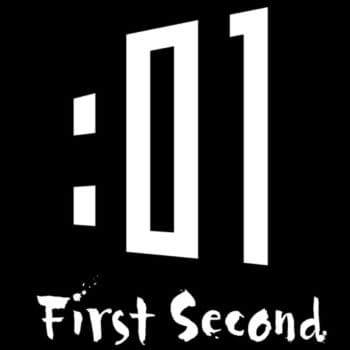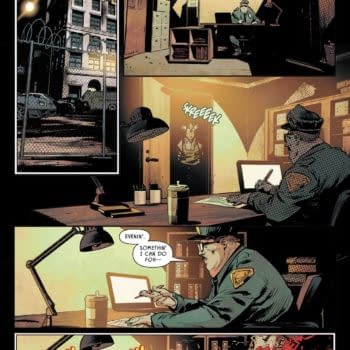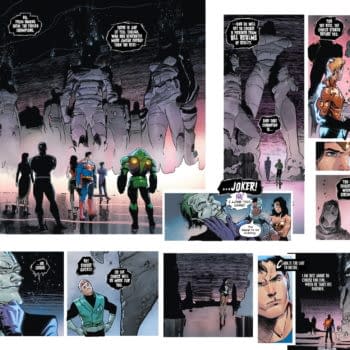Posted in: Comics | Tagged: ales kot, comics review, image, zero
Talking To Ales Kot About Zero – Look! It Moves! by Adi Tantimedh
Adi Tantmedh writes;
This week sees the first issue of ZERO from Image Comics, the new spy series by enfant terrible Ales Kot.
Edward Zero is a kind of all-purpose operative who's sent in for surgical strikes, for when things get messy. He's a death machine trained from childhood to handle any situation, and with that comes moral decisions and traumas most people wouldn't wish on their worst enemy, but he bears them as part of his duty, and a bitter duty it is.
There's something different about ZERO. Not only the fact that each issue is drawn by a different artist, but also its tone and point of view. This isn't just another spy series. There are layers at play in each issue. Kot is insanely well-read in Politics, Psychology, deconstructionist and post-structural theory and, of course, genre fiction, and had some questions, issues and ideas of his own he wanted to explore.
So I took the opportunity to grill him for the book's release week.
I know spy stories are part of our cultural DNA. We all grew up with spy stories. What prompted you to write your own?
The repetitive patterns of the good / bad dynamic in plenty of fiction. The repetitive patterns of the good / bad dynamic in plenty of our world. I was wondering about the kind of a spy I would want to explore. I was wondering about the spy stories that affected me. About the noir that affected me. And what I came up with was someone who does really brutal things for what he is convinced is a very good reason — and unlike, let's say, Walter White, it's not about the character's hypocrisy, but about his conditioning and maybe even his genetic memory. What happens when you grow up in a world that celebrates murder as a means to an end? What happens when you're taken in by a team of people who exploit war scenarios while looking like the white knights? What happens when you start snapping out of it?
These were some of the questions I asked myself when I began.
You combine not just the spy story but elements contemporary political events with "20 minutes into the future" Science Fiction (let's call it Science Fiction, since "Speculative Fiction" is really the snob's way of saying "Science Fiction). Is this your take on how to write commentary into a spy story?
I prefer "speculative fiction" here, as it covers a wider ground. As for the commentary element…yes. At the same time, I am not interested in preaching. I am interested in layering. The reader is intelligent enough to discover what she or he wants. My work has to deliver possibilities wrapped up within the story itself.
Many spy stories are escapist, glamourous male empowerment fantasies as established by the James Bond novels and movies. You seem to want to dig deeper into the psychology and the damage of being a particular kind of spy, the kind considered the "blunt instrument" as Bond used to be called. How important is that to you?
Very. Zero is an exploration of wounds. Some we inflict ourselves, others are inflicted by the society before we even know how to take care of our own needs. Zero is an exploration of scars, too, and Zero is most definitely also a healing process. I can trace a clear link to work of David Cronenberg because it's also very concerned with wounds and body horror — external and internal. The gaping wounds of the psyche and how we move with them, how we transcend them, how we can be pulled down by them.
There was a strong sense of public excitement when Daniel Craig became the next actor to tackle James Bond and Casino Royale was released. The creators of that film went back to the basics and worked with some of the themes that found their way into Zero. There's a thrill in seeing someone achieve incredibly risky things and be, for all senses and purposes, a human tank — and there's also horror in the recognition that what that person is doing is killing people without really knowing why. It's fiction, yes — but then you meet and see people who use the same mindset in their daily lives and things change.
– You've admitted in other interviews that writing is autobiography, so tell us a bit more about exploring certain emotional themes through the prism of the spy story.
Aggression — while I am good at using it in creative ways and turning the bleak energy into work or non-problematic physical movement like running or martial arts, I am aware of the density of it within me. This comes down to:
a) Biological identity, genetic memory — as in, my grandparents were deeply affected by the World War II and their wounds have transferred, in often unrecognized ways, throughout generations. They affected my parents, then the Russian occupation of Czech Republic from 1968 to 1989 and the resulting totalitarian government affected everyone, my parents had me in 1986, the year of the Chernobyl collapse…and there's plenty more from all that, experiences, ideas, beliefs. It's up to me to understand and dissect them so I can decide which ones I want to keep, which ones I want to modify and which ones I want to thoroughly shed and leave behind.
b) Conditioning — what I said about my family being affected by these events also applies to the entire area and the entire country. I grew up in a place that is very similar to the North of England. Beautiful woods, serene blocks of land and kind people coexist with mines, gigantic factories, sickening pollution, weak education facilities, rabid unemployment and deep damage that carries itself through generations unless someone says stop, and people can often be too tired to say stop if they have to work two jobs and no-one ever taught them that saying stop is a good thing sometimes. Combine that with the totalitarian government influence that was in place for more than twenty years…
…my growing up was a combination of many different factors, seeing many different facets of society and people. Substance abuse, genuine yearning for something better, bullying, rampant criminality, explosion of capitalism in a freshly democratic state, the transfer of power within the political sector, internal and external violence, bursts of hope…all of it was present near-constantly, I could go on and on. I am doing my best to remember everything and process it and I believe it will take me the rest of my life, which is perfectly okay.
You've picked in the first few issues alone stories with specific hot-button political events like the Occupied Territories and the Israeli-Palestinian conflict, then Northern Ireland. Many writers either avoid real politics altogether or end up with a particular stance that might add to pro- or con- propaganda out there. How important was it for you to explore the morality of political events without falling into that trap?
Very. I wear my politics on the sleeve, and my politics are not concerned with aligning to the left or to the right. My politics are concerned with exploring, depicting and navigating the reality of what is inside and outside me — whether it's via more surreal means such as in "Change" or via a narrative that is slightly more grounded like "Zero."
Turning a blind eye to the world would mean, in case of creating Zero, that I would be untrue to what the comic asked me to be.
From the first issue, you've made it clear that Zero's life is not necessarily a glamourous one. In fact, he might be heading to a bad end if he even survives long enough. Is that part of the commentary on the existential nature and implications of such a character and his life?
I am letting the character move freely as he grows. I do have some points I want to hit. At the same time, there is a lot of empty space because I love to improvise, to invite freedom into the act of creation. Nothing is set in stone and any commentary I might want to get in is secondary to what the story asks me to be.
For example, I had no idea what the story in #4 would be beyond the spine of it — a nine-year old Edward Zero is sent on his first mission to assassinate a supposedly ex-IRA high-ranking person. Then I started writing, page by page, letting things go from my fingers as they were getting the signals from somewhere inside me connecting threads with the previous three issues and setting up future ones, sometimes half-thought out, sometimes very well-thought out, sometimes completely new and contradicting what I originally thought would happen…and the thing is, when it's right, the story tells me. I trust the story. I believe in the story.
And perhaps this is the way the universe works — one has to give it their absolute trust and belief in order to arrive where they want to be. After all, we may just be the stories our brains are telling themselves. To paraphrase Vonnegut, we become what we believe ourselves to be, so we must choose our beliefs wisely.
So is this a series with a finite ending at some point?
Yes. It ends right where it begins. Dover, 2038
The ending is not set in stone.
Make of that what you will.
Counting to zero at lookitmoves@gmail.com
Follow the official LOOK! IT MOVES! twitter feed at http://twitter.com/lookitmoves for thoughts and snark on media and pop culture, stuff for future columns and stuff I may never spend a whole column writing about.
Look! It Moves! © Adisakdi Tantimedh


